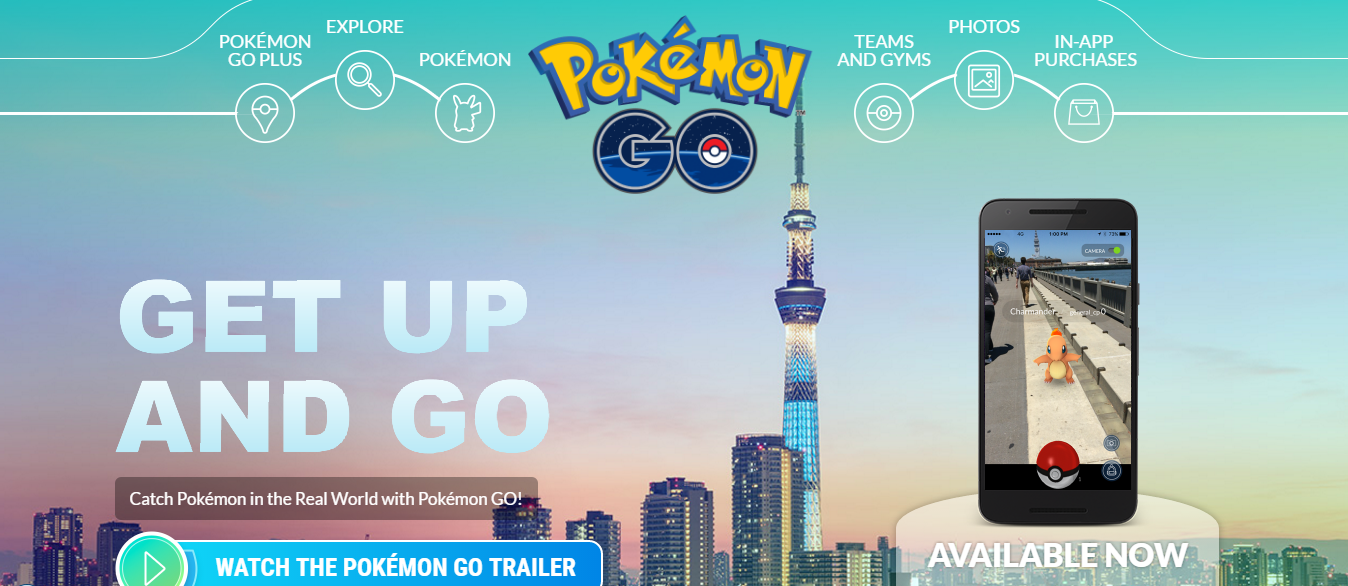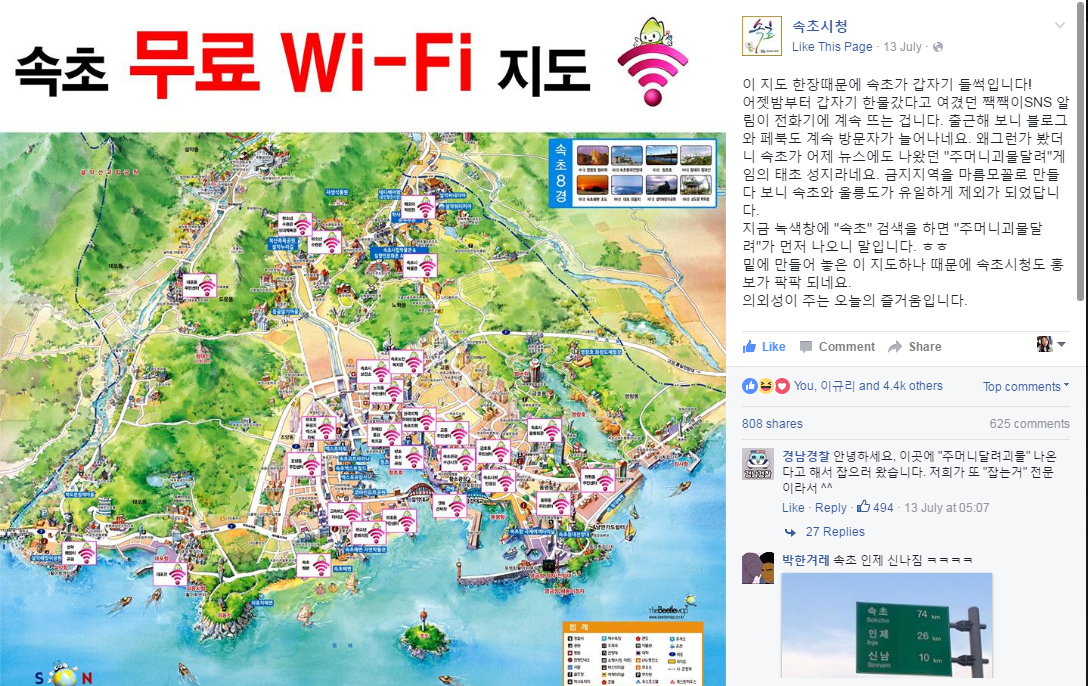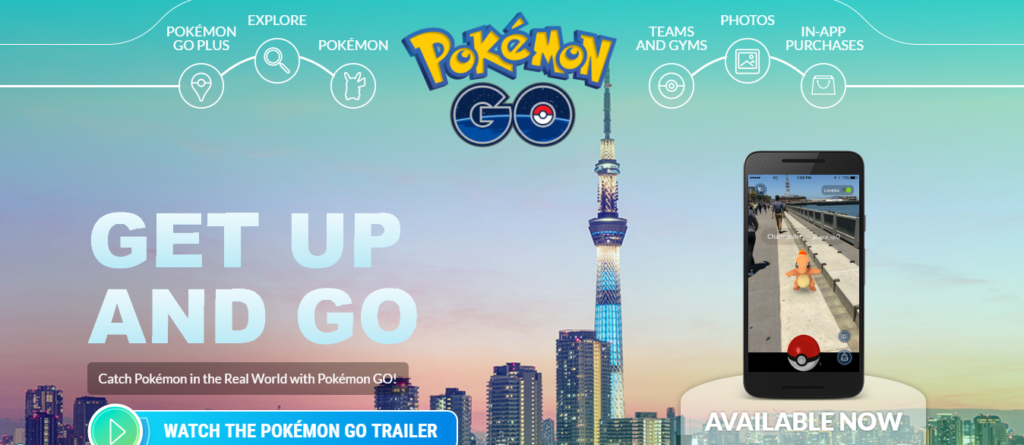Although Pokémon GO has been launched in only a few countries, the aspiration for it is boiling up across the world. Will Pokémon GO be able to fundamentally influence on the tourism industry and restructure how to execute tourism marketing?

(Pokémon GO Website)
Pokémon GO is a smartphone game enabled by the location-based service (LBS), where smartphone users become ‘Pokémon trainers’. They seek out Pokémons shown on the app, catch them throwing PokeBalls, and train them at gyms. Unlike computer games, since Pokémon GO requires users to actually explore the areas in their neighbourhood (or travel further!), some say Pokémon GO has achieved what Fitbit has not managed completely (i.e. encouraging those who do not exercise and/or like to be home to go out for walks and running).
(Pokémon GO Trailer)
The augmented reality technology (AR), a technology that can overlap and present virtual features on the reality which Pokémon GO is based on, is not something that is never heard of; it has been already used in some industries and the potential of its wide use on the commercial purpose has been discussed often. Still, the concept of the augmented reality was not perceived as familiar to the public enough to be widely used in their routines.
Well, not any more with Pokémon GO.
When it comes to describing the cultural phenomena in 1990s, it cannot be complete without mentioning Pokémon, when a lot of kids wished to become Pokémon trainers. And today in 2016, they who are now adults can finally make that wish come true through Pokémon GO.
Not only does Pokémon GO make them happy but also the game developers. From the company’s perspective, its customers are likely to have (or begin to have) the reliable level of income as well as the nostalgia for their childhood. The combination of the two is possibly the most idealistic, allowing low cost for establishing the brand awareness and a high chance of the in-app purchase. On top of this, with all the buzz about Pokémon GO created by this group of users, younger groups would also feel like jumping into the craze downloading the app on their smartphones. No wonder why Nintendo’s stock has dramatically increased recently!
Thanks to Pokémon GO, the possibility of popularisation of augmented reality seems to be proved. It has opened a new thread of thoughts on its application within the tourism industry as well as many other fields.
In that sense, now is THE moment for marketers to pay attention. There are already lots of cases reported that local businesses benefit from Pokémon GO’s popularity, being assigned as spots for catching Pokémons and as gyms for training them: a restaurant in Australia shown as a Pokémon gym; a supermarket where you can get Pikachu at the batteries section just to name a few.
Among numerous cases, one particular example in South Korea catches an attention in the tourism industry: Sokcho City Government.
In South Korea, the Government has restricted Google Map’s service for the security reason, which is essential for Pokémon GO to be launched. This means in theory Korean users cannot enjoy Pokémon GO. Sokcho and the neighbouring regions, however, happened to receive the grace being left out from grids that set no-service areas. This was the greatest pleasure for Korean players who somehow managed to download the app. They headed for the city, resulting in every bus ticket to Sokcho being sold out despite week days.

(Facebook Page of Sokcho City Hall: A map of free-wifi around the city was posted on its Facebook Page, responding to the unexpected volume of social mentions and traffic re. the city becoming the must-go place for Korean Pokémon GO players)
Although marketers ought to have an ability to predict a variety of scenarios and to prepare plan Bs in advance, they also need to be able to make most of opportunities when they encounter surprising golden tickets, just like now for the Sokcho City Government. It will be interesting to follow up how much the Sokcho City Government can take advantage of it becoming the ‘holy place’ for Korean Pokémon GO players.
Because of the characteristic of the augmented reality for linking the real and the virtual world, businesses and local governments in the tourism industry have to keep an eye on this phenomenon. The augmented reality could work in favour of the tourism industry, since relevant virtual contents (e.g. Pokémons) appear only at real sites (e.g. places in Sokcho City). Had Pokémon GO been a virtual reality mobile game, its contribution would have been limited in attracting game players to physically existing places.If marketers in the tourism industry apply the operation frame of Pokémon GO (the augmented reality and gamification), it might be possible for us to anticipate more creative strategies for appealing to visitors to their businesses and more engaging interactions between tourism businesses and visitors.
…
As Pokémon GO was launched in London, I also downloaded the game on my phone to ‘investigate’ (as a self-case study, believe it or not) the potentials this game app has to boost the tourism industry and whether it can fundamentally influence on the way of tourism marketing. While playing it, I will list up any opinion and idea relating to the studying points for following blog posts. 🙂
…
This post is a translated version of my own Korean post from another blog. To see the original post in Korean please click here.
——-
Articles that are worth a read:
– Pokémon Go Players Encouraged to Run Wild in Supermarket, but maybe not at a Police Station:
http://mashable.com/2016/07/08/pokemon-go-police-station/#6cbNdL6qGmqt
– Pokémon Go is Helping Restaurants and Bars Make Money:
– [KOREAN: A vieo message from the Mayor of Sokcho City to those who visit the city to play Pokémon GO] ‘포켓몬고’를 하러 오는 사람들에게 속초 시장이 당부의 말을 보내다 (영상):
http://www.huffingtonpost.kr/2016/07/13/story_n_10955954.html?ncid=fcbklnkkrhpmg00000001
– Pokémon Go Now the Biggest Mobile Game in US History:
http://www.cnbc.com/2016/07/13/pokemon-go-now-the-biggest-mobile-game-in-us-history.html
– South Koreans Flock to Remote Nothern Area to Play Pokémon Go:


